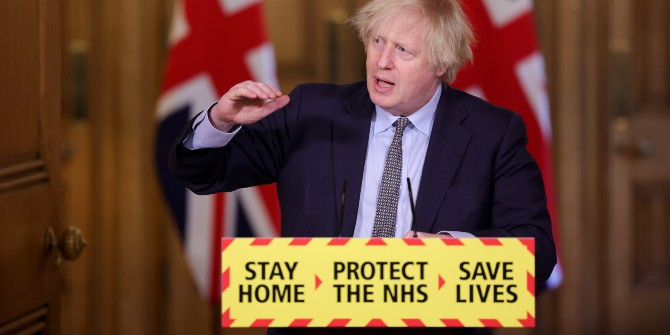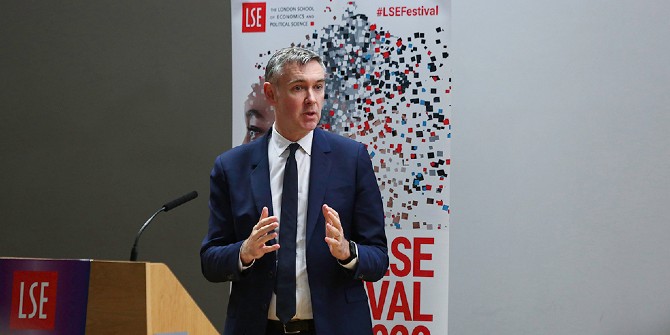Creating a strong sense of reciprocity between the state and its citizens makes it more likely they will pay taxes willingly, says Timothy Besley (LSE). As we emerge from a pandemic that emphasised the importance of mutual obligation, there is an opportunity to persuade higher earners that paying tax is part of that reciprocity. Solutions for funding social care can also build on this.
Like many advanced economies, the UK relies heavily on higher earners funding the lion’s share of public spending, and creating a sense of reciprocity is part of the bedrock of norms that underpin the governance of modern societies. This leverages an idea that lies at the heart of all successful human societies and underpins everyday relationships between families and friends. But how this reciprocity applies evolves and adapts as institutions change, influencing as well as being influenced by government intervention.
It has two important dimensions. The first is the ideal of a formal contractual obligation, where each side’s obligations are detailed in a formal, written agreement—like that of an employment contract. The second takes the form of tacit understanding—for instance, the expectation that a child should help an ageing parent when they become too frail to manage.
We need a better appreciation of the importance of reciprocity if we want to understand the history of public intervention, and how it will evolve to meet new policy challenges. The state is not just a means for coercing individuals to pursue the common good. It should seek to inculcate feelings of reciprocity between the state and the citizen and ultimately enhance its function, such as in the collecting of taxes.
During the COVID crisis, citizens willingly sacrificed aspects of their social and economic lives for the general wellbeing of all. That willingness is enhanced by an expectation that the state will support them through measures such as furlough or provide support for those self-isolating. At the heart of this lies the idea of reciprocal obligation.
Thousands of years of human experience have shown that reciprocity is advantageous for populations who make use of it. Social organisation built on reciprocity confers a competitive advantage. This basic human instinct is reinforced by family structures and social arrangements; we seek to punish those who harm us and to reward those who help us.
If one side of the reciprocal arrangement is the government, then its sovereign power over the law may provide limits on how binding these arrangements are into the future, with the government—whether a new one or not—almost unfettered. We have seen this time and again with pensions, where governments find it convenient to change arrangements at will (e.g., by changing the retirement age) even if citizens had based their plans on the existing covenants staying in place. Policymakers need to be aware of the perceptions of political risk this can provoke.
Reciprocal arrangements have rested on a range of informal punishments for transgression, such as withdrawing future cooperation or ostracism. In the case of relationships between the citizen and the state, these can include voting governments out of office, non-compliance with laws and regulations, or popular protest. Also relevant is whether the benefits of reciprocity are private or widespread. This is important because individuals may have views about the principles of any policy that they expect governments to adhere to, rather than just judging the policy in terms of its effect on their personal loss or gain.
Effective government comprises a mixture of formal institutions and informal social norms. These norms provide ways of coordinating beliefs and so affect behaviour in social situations. A good recent example is wearing a face covering to protect against COVID transmission. Values like selfless public service and the setting aside of self-interest in the public sphere are norms that contribute towards establishing a civic culture and are crucial to prevent corruption. Choosing to vote or to participate in political activities also underpin norm-driven “civic cultures”.
Many rulers have seized power by force and/or ruled through intimidation. There is nothing to stop such leaders from tapping into reciprocity, especially when they are seeking to raise tax revenues. Yet they face an uphill struggle to convince their citizenry that the state will consistently deliver common-interest programs that help to build such reciprocity.
Two institutions have emerged to remedy this: constraints on executive power and the selection of leaders in open competition, especially elections. These not only restrict the abuse of the state for patronage and corruption, but also foster greater cohesiveness between groups as they acquire the power to overrule or amend policy proposals. They reassure citizens that universal benefits such as social insurance and widely valued public goods will be a priority. Indeed, the most basic public good of all, the rule of law, fundamentally requires a system in which leaders and citizens alike are treated as equals before the law.
Reciprocity kicks in when states deliver collective goods for citizens and, in exchange, when citizens offer their support, whether by paying taxes, volunteering for military duty, or obeying the law. Institutions that guide the government along rails that pursue the public interest reinforce norms of faith in the government. They provide reassurance that tax revenues will support common interest public spending, rather than being abused.
Citizens observe how the state behaves and form a view of the likelihood that it will indeed reciprocate should they comply. Pivotal moments such as wars or pandemics can crystallise these impressions. At certain moments, strategic and far-sighted initiatives can be implemented in the form of policy or institutional change, which lay the groundwork for reciprocity in the long-term: the decision to found the NHS after World War II was one such moment.
Tax policy
Many economists assume that tax relies principally on the coercive power of the state, with compliance enforced by detection and fines. There is considerable evidence that taxation leads to disincentives, with citizens seeking to avoid paying the due amounts in full or otherwise trying to reduce their tax bill through avoidance or reducing their earnings. By this account, the limits of taxation are viewed as being set by disincentives and by enforcement power.
But this approach, which separates tax-raising from spending, misses some important issues. First, there is the possibility of reciprocity being built into the system, such as when paying taxes directly entitles individuals to future benefits from the state. This form of reciprocity will attenuate disincentive effects of taxation compared to the standard approach and is particularly relevant for social insurance. In this case, the basis of the relationship is entirely material, founded on a transactional relationship between the state and the citizen—a more elevated version of “you scratch my back, I’ll scratch yours”.
There is, however, a second reason for reciprocity’s importance, which is grounded in the social contractarian ideal of reciprocal relations between the state and citizen. On this account, citizens are willing to comply as long as they believe that the state will generate future benefits in general—for society as a whole. The focus is not purely on themselves as individuals. In theory, this too could attenuate disincentives, with citizens becoming willing contributors of tax revenues in the belief that it will benefit them and, more crucially, society, now and in the future.
Some evidence for this idea can be found in the World Values Survey/European Values Survey, which asks respondents: “Is it justifiable to cheat on your taxes if you have a chance?” Around 63% of the population do not think that cheating is justifiable. Those who do have higher incomes and tend to be younger, less educated or lack confidence in their governments. Nonetheless, there are striking cross-country differences—and when one looks at cohorts of individuals over time, there is strong intracountry persistence in answers to these questions, thus intimating that the cultural and institutional factors that shape answers persist. These findings suggest that there are reciprocal norms that sustain high levels of taxation and that the narrow economic point of view—that people are essentially only focused on the best deal that they can get for themselves—need not monopolise the conversation on what drives state-citizen relations.
One corollary is that we may need to soften the distinction between tax avoidance and tax evasion. Even when failing to pay taxes is not formally illegal, it may violate norms. The kind of disapproval and media attention that comes when wealthy celebrities push the boundaries to reduce their tax compliance conveys the power for norm-driven forces in driving taxation. Just because it is labelled as avoidance does not make it socially acceptable.
Social insurance
Social insurance has always been a core way in which states have created reciprocity between citizens and the state. It is both a source of material reciprocity and part of a wider social contract. Further, it absorbs into the domain of the state a fundamental form of reciprocity: control over the life cycle, something which historically has rested in the bosom of the family.
All forms of social insurance share two features: that risk sharing is better than individual savings to cope with the idiosyncratic timing of risks, such as sickness or unemployment; and that it is an efficient way of pooling longevity and infirmity risk over the life cycle. It is the universality of the contributory principle’s appeal—taken up by a liberal like Beveridge in the UK and a conservative like Bismarck in Germany —that explains its widespread support and explains why it was a foundational part of the welfare state in both countries.
Nonetheless, the UK has gradually moved away from a contributions-based system, even though it continues to maintain a somewhat artificial distinction between income tax and national insurance contributions (NICs). The former raised about £193bn in 2019/20 and the latter almost as much, at £143bn. Even though the latter is levied on both employers and employees, there is a “first-principles” economic argument as well as reasonable evidence to support the claim that it is a tax on workers, regardless of who pays it. Even if the national insurance scheme is framed as contributory, it functions in much the same way as the formal income tax.
These issues have gained new resonance in relation to recent government announcements to fund social care provision through a rise in NICs, pending the introduction of a new bespoke tax. The reciprocal element will become more apparent over time as those who have contributed through the tax can see the benefits to their families and wider society. Narrow “point in time” weighing up of who is paying and who is receiving misses the point.
Still, there are some distinctions in how NICs and income tax work, notably an upper earnings limit for core NICs, with employees paying a lower percentage of the upper bounds of their income. The UK system therefore retains some vestiges of the original contributory funding model.
However, there is almost no connection between NICs and benefits, while the elements that made up Beveridge’s original proposal for the welfare state have been largely dismantled. The UK now has nothing resembling an unemployment insurance programme, preferring a system based on constructing a floor on consumption, using benefits. And the link between NICs and any form of public spending is largely mythical, even though political rhetoric may occasionally try to link taxation to benefits.
The IFS’s Mirrlees Review recommended merging income tax and national insurance contributions in favour of a comprehensive income tax system with all elements of the contributory principle. Some argued against this, largely on the basis that the disincentives to earn may be different when citizens perceive a benefit from paying certain taxes. But the psychological link between benefits and taxes can be much more than a calculation based on personal benefits and costs, instead being portrayed as citizens’ participation in a system that protects those who face risks or suffer misfortune. Net contributors and net beneficiaries tend to even out over the life cycle. And even where they do not, universality in providing insurance can be an appealing way to understand the value of taxation in a way that links strongly to the evidence on quasi-voluntary compliance with taxation.
Yet this model is partially in tension with the view that sees redistribution as one of the primary motivations for state action and conflicts with the view that spending programmes should, as a matter of principle, be targeted at those in need. A comprehensive social insurance scheme would also support income replacement for people on higher incomes, something that the UK chooses not to do. These concerns were germane to the design of the recent furlough scheme, which paid 80% of an individual’s wages but limited this at a maximum of £2,500 per month. A social contractarian perspective building on principles of reciprocity at the heart of the state would tend to support a larger, but perhaps more universal, set of programmes, thus justifying the slightly higher tax rates—particularly on higher earners—necessary to sustain them.
As we emerge from the pandemic, the question of whether we need a universal form of insurance, properly funded and more comprehensive, should be firmly on the policy agenda. The temptation to more narrowly target available resources rather than stress universal programmes looms large. Given how dependent the UK has become on a small group of relatively well-off taxpayers to fund the state, the political reality of ensuring that all higher earners fully comply with the tax regimes should not be underestimated.
A rich conception of reciprocity gets away from a narrow self-interested and material conception of what matters. The recent rise of populism, whether from left or right, is frequently about fomenting division. It is rightly seen as a threat to the social contract and antithetical to basic liberal principles. Politicians that stress the use of the state as a redistributive tool often fail to appreciate the delicate balancing act that building a successful state requires. Stressing universal obligations, values, and programmes is a core part of a successful political economy.
This post represents the views of the author and not those of the COVID-19 blog, nor LSE. It is an edited extract from Besley, T., 2021. Reciprocity and the State. LSE Public Policy Review, 2(1), p.1.





